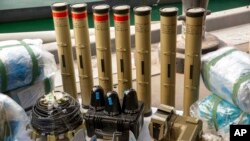Western powers say they have intercepted another illicit shipment of Iranian weapons, the seventh such seizure in the past three months.
The seizure, announced by Britain Thursday, took place last month in the Gulf of Oman.
Britain’s Defense Ministry said it began tracking the Iranian vessel on February 23 when it noticed the ship traveling at high speeds under the cover of darkness.
Royal Marines then boarded the ship after the suspected smugglers initially ignored calls from Britain’s HMS Lancaster and tried to return to Iranian territorial waters.
The United States said Thursday it provided airborne surveillance during the operation, which took place “along a route historically used to traffic weapons unlawfully to Yemen.”
Both Britain and U.S. Naval Forces Central Command, based out of Bahrain, said the Iranian ship was carrying Iranian versions of Russia’s 9M133 Kornet anti-tank guided missiles and medium-range ballistic missile components.
Britain’s ambassador to the United Nations, Barbara Woodward, said Thursday on social media that she has notified the U.N. Security Council of the seizure.
According to the U.S., this is the seventh time in just the last three months that Western allies have intercepted Iranian vessels trying to smuggle weapons and drugs out of Iran.
Those naval interdictions have led to the seizure of more than 5,000 weapons, 1.6 million rounds of ammunition, 7,000 proximity fuses for rockets, 2,100 kilograms of propellant for rocket-propelled grenades, 30 anti-tank guided missiles, medium-range ballistic missile components and $80 million worth of illegal drugs, the U.S. said.
Earlier this week, a top U.S. defense official warned Iran’s increased cooperation with Russia has made the regime in Tehran a “global challenge.”
Speaking with reporters Tuesday, Deputy Assistant Secretary of Defense Dana Stroul called for "a global coalition to push back on the malign cooperation between Iran and Russia."
A second top U.S. defense official warned Tuesday about Iran’s nuclear program.
Undersecretary of Defense for Policy Colin Kahl told lawmakers that Tehran can now produce enough fissile material to make a nuclear bomb in just 12 days, down from 12 months in 2018.
Rafael Grossi, director general of the International Atomic Energy Agency, said Thursday he will be traveling to Iran for “high-level meetings.”
The IAEA, the United Nation’s nuclear watchdog, has been talking with Iranian officials about its near-weapons-grade enrichment of Uranian at one of its plants.
VOA's Margaret Besheer and Chris Hannas contributed to this report.










